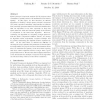Free Online Productivity Tools
i2Speak
i2Symbol
i2OCR
iTex2Img
iWeb2Print
iWeb2Shot
i2Type
iPdf2Split
iPdf2Merge
i2Bopomofo
i2Arabic
i2Style
i2Image
i2PDF
iLatex2Rtf
Sci2ools
SDM
2011
SIAM
2011
SIAM
A Fast Algorithm for Sparse PCA and a New Sparsity Control Criteria
Sparse principal component analysis (PCA) imposes extra constraints or penalty terms to the standard PCA to achieve sparsity. In this paper, we first introduce an efficient algorithm for finding a single sparse principal component (PC) with a specified cardinality. Experiments on synthetic data, randomly generated data and real-world datasets show that our algorithm is very fast, especially on large and sparse data sets, while the numerical quality of the solution is comparable to the state-of-art algorithm. Moreover, combining our algorithm for computing a single sparse PC with the Schur complement deflation scheme, we develop an algorithm which sequentially computes multiple PCs by greedily maximizing the adjusted variance explained by them. On the other hand, to address the difficulty of choosing the proper sparsity and parameter in various sparse PCA algorithms, we propose a new PCA formulation whose aim is to minimize the sparsity of the PCs while requiring that their relativ...
Data Mining | Principal Component Analysis | Principal Component Analysis Pca | Schur Complement | SDM 2011 |
| Added | 17 Sep 2011 |
| Updated | 17 Sep 2011 |
| Type | Journal |
| Year | 2011 |
| Where | SDM |
| Authors | Yunlong He, Renato Monteiro, Haesun Park |
Comments (0)

